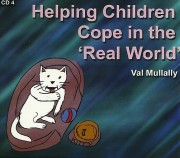‘How do I give my twelve year old freedom but also keep an eye on her without her thinking that I don’t trust her?’

What’s helpful when teenagers are pushing for freedom and you’re worried about their safety?
As parents we develop strategies to try to keep our teens safe – but not all are necessarily helpful.
The Checking Up Strategy
What I think isn’t helpful is ‘sneaky’ checking up.
I think of one mother who used to surreptitiously check her teenage daughter’s phone. The daughter resorted to renaming the ‘not- allowed’ boyfriend as ‘Jenny’ on her phone.
Life has a strange way of boomeranging – and if you do sneaky you’re likely to get sneaky.
One of the things that I did with my sons that was helpful was to have a policy that if they wanted to go out, we, as parents, would be phoning the parents who were hosting the event so that we could check arrangements.
They knew this was the deal and that we would not agree to them going out if there was anything that was of concern to us.
The ‘ParentPepTalk’ Strategy
I was so anxious that my sons would turn out ‘right’ that I thought it was my job to repeatedly remind them what ‘good’, responsible behaviour looked like. Now I look back I recognise that my sons had been taking ‘snapshots’ of ‘how we do life’ from a very early age. By the time they get to their teens they have a complete reference catalogue stored up –
how we do conflict
how we deal with upset feelings
what we do if we can cheat and get away with it
how we show love
what’s okay and not okay.
The endless list is already stored and the last thing teens need or want at this stage of their lives is the constant peptalk. When my son was in his early teens he told me about boys drinking at parties, he immediately got the ‘That’s not okay, please don’t you ever do that, I’ll be so disappointed, blaah, blaah, blaah’ ad infinitum lecture. So what happened within a couple of years is he stopped telling me what was happening in his life. The wiser me now recognises that he was telling me because he was trying to make sense of the standards we’d encouraged. It would have been more helpful if I’d just listened to what he wanted to share and asked his opinion.
We can get so worried by what we think might go wrong that we only focus on the negatives. What I know now is that if a child has a strong sense of self-esteem she’s not going to be trying to fill the ‘hole in her soul’ with drink, drugs, sex and all the other parent nightmares. A child with a strong self-esteem has an inner core she can rely on.
So how do we build young people’s self esteem?
Recognise that self esteem is much more than self confidence. Self Esteem is like a three legged stool and confidence is only one of those ‘legs’. Like any stool we need the legs to be of equal length and strength for a stable base. I’m most grateful for learning this concept through Jesper Juul’s book: ‘Your Competent Child’.
So let’s look at each of these:
Confidence comes from our sense of competence. Learning to be able to do things for yourself and to be able to figure out what’s needed is all part of confidence building. Obviously a situation that’s too big and overwhelming and beyond the child’s control will have the opposite effect and would damage the child’s confidence. That’s why it is important that we as parents both build our children’s confidence and also set clear boundaries around what we do and don’t permit.
Confidence is built when young people can figure out their own solutions. If parents are always rushing in to solve every dilemma, how do children learn? Ask yourself if there are times when it would be more helpful to let your child take the consequences of her action (or inaction).
Belonging In the teen years a sense of being part of the group becomes very important. The challenge comes when your child loses a sense of ‘belonging to herself’. Our need to feel connected to ourselves (our autonomy) and our need to be connected with others is like a see-saw. Both parts are necessary and the balance will only be kept if it’s firmly grounded in unconditional love.
When you get the first ‘teenage rumbles’ rather than resort to ‘Because I said so’ or caving in, focus on seeing these as opportunities to help the child keep connected with herself and her values and to learn to negotiate with you.
Worth Your child needs to know that nothing she does can add to or take away from her intrinsic worth. When she knows this she’ll know you are the ones to turn to when life’s uncertain.
When your child has a self esteem stool with three strong legs of confidence, belonging and worth, she has a stable base to deal with the challenges of teenagehood.
Our children are already born with incredible potential to beautiful, wise, creative, compassionate, wonderful people.
It’s our job as parents to create conditions for them to thrive. 
You’ll discover more insights and practical tools in my CD ‘Helping Your Child Cope in the Real World’. Also available as MP3.
Helpful books on this topic:
Your Competent Child Jesper Juul
The 7 Habits of Highly Effective Families Stephen Covey
Reviving Ophelia: Saving the Selves of Adolescent Girls Mary Pipher
Real Boys: Rescuing Our Sons from the Myths of Boyhood William Pollack


I really appreciated this article, makes so much sense
Thanks
My pleasure : ) Thanks for feedback Analea
Your article is valuable! Our children take many “snapshots” as you say. And they gain confidence through their accomplishments, not by telling them how wonderful they are. Recent research shows that if people have a strong self image they do feel good when they hear such affirmations. But if they don’t like themselves, their mood actually goes down when they hear such statements, or when they are told to say such things to themselves.
Thank you for your comments, Tricia. Your observation on recent research re affirmation is interesting.If you have a reference for that, please advise.
Very helpful post! I think it’s very important to protect your child’s mobile phone or tablet and get peace of mind. There are multiple apps that can prevent your child from watching harmful content or gaming. I found MobileMinder to be great. You can block apps, websites, see who’s calling or texting your kid. I have a promo code for any one interested in it which will give you 30% off after your free trial.
The code is MMPROMO